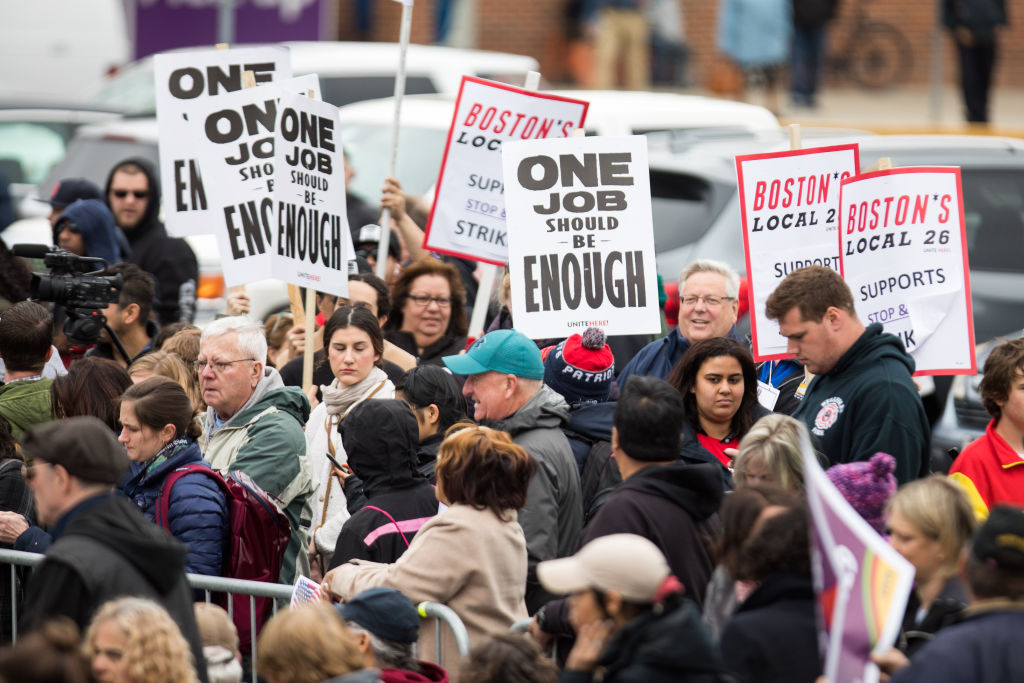

Share
After more than a week of strikes, 31,000 workers at Stop & Shop, a major supermarket chain in the northeastern United States, will go back to work thanks to a tentative new contract with their employer. The United Food and Commercial Workers announced that the proposed contract — which still requires a vote from union members to be ratified — “preserves health care and retirement benefits, provides wage increases, and maintains time-and-a-half pay on Sunday for current members.”
When the Dutch company Ahold completed its merger with the Belgian Delhaize Group in 2016, the resulting $29 billion company became one of the biggestsupermarket chains across the entire United States. In addition to Stop & Shop, the company owns grocery stores like Giant and Food Lion, as well as grocery delivery services like Peapod.
Ahold-Delhaize boasted of massive savings to come from the merger, in addition to more than $200 million in savings last year alone from the 2017 Republican tax cuts. But rather than share that wealth with its workers, the company has returned roughly $4 billion in stock buybacks to enrich shareholders over the last few years.
Ahold-Delhaize itself said that the “best talent is key” to its financial success in a media release of its 2018 earnings. And workers know that, too. “This is not a company in financial trouble,” the UFCW said in a statement, pointing to Ahold-Delhaize’s $2 billion in profits last year.
And yet, the company continued to hold up contract negotiations. They refused, the UFCW said, to back down from proposals to cut healthcare, pay, and pensions. Stop & Shop also wanted to institute a two-tier system that would offer future employees less in benefits, which current employees found unconscionable — as well as a threat to solidarity down the line. That’s why 31,000 workers decided to walk off the job for more than a week. While Bloomberg reports that the new agreement does have some cuts for future employees — which continues to be a concern for workers — they do expect the contract to be ratified.
The choice to strike was met with widespread community support. Presidential candidates, like Elizabeth Warren, brought plenty of press attention to the picket line. And as New England’s Jewish community prepared for Passover, several rabbis urged their congregations to boycott Stop & Shop.
“The food that you’re buying is the product of oppressed labor and that’s not kosher,” Rabbi Barbara Penzner, of Temple Hillel B’nai Torah, a reconstructionist synagogue in Boston, told the Associated Press. “Especially during Passover, when we’re celebrating freedom from slavery, that’s particularly egregious.”
The striking workers also had the backing of some of the cutest members of their communities. One example — workers were joined by their dogs on the picket lines.
The Stop & Shop strike also helped inspire a new generation of labor leaders. Toddlers and their parents joined the picket line in a “playdate protest” organized in part by Massachusetts Jobs with Justice.
The young protesters and their parents crafted signs, sang songs, and read stories about labor leaders. Joining the picket line was an opportunity for families to show their solidarity with Stop & Shop workers while teaching future labor organizers a lesson about worker power.
“We hope to educate kids about labor and the importance of strikes and unions,” Lily Huang, a co-director of Massachusetts Jobs with Justice, told the Patriot Ledger. “We hope they have a fun day together and show the Stop & Shop workers that we and the entire community really support them.”
This article first appered in Inequality.org



